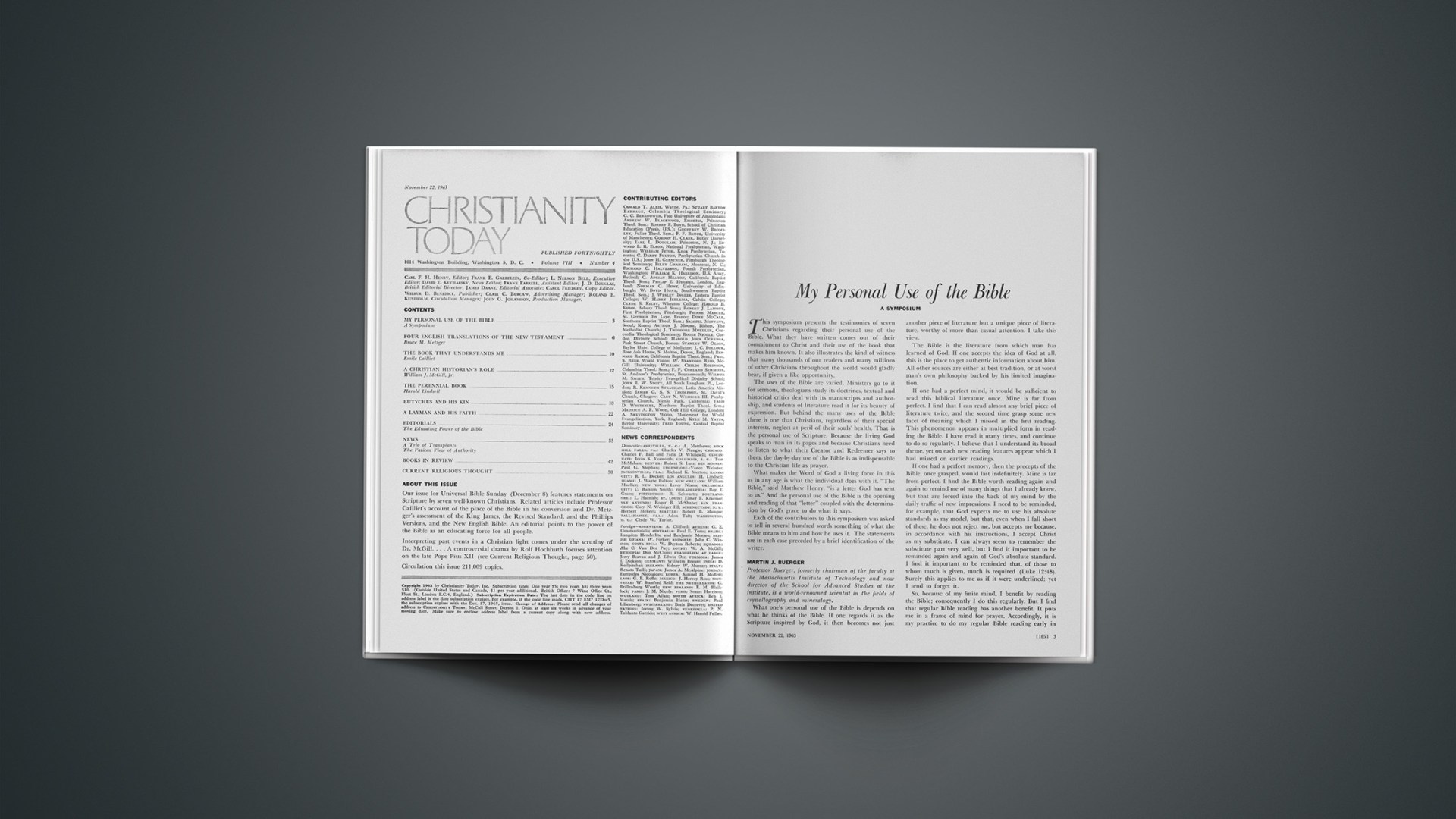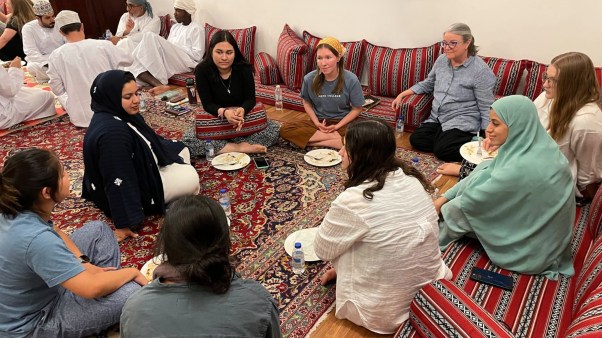This symposium presents the testimonies of seven Christians regarding their personal use of the Bible. What they have written comes out of their commitment to Christ and their use of the book that makes him known. It also illustrates the kind of witness that many thousands of our readers and many millions of other Christians throughout the world would gladly bear, if given a like opportunity.
The uses of the Bible are varied. Ministers go to it for sermons, theologians study its doctrines, textual and historical critics deal with its manuscripts and authorship, and students of literature read it for its beauty of expression. But behind the many uses of the Bible there is one that Christians, regardless of their special interests, neglect at peril of their souls’ health. That is the personal use of Scripture. Because the living God speaks to man in its pages and because Christians need to listen to what their Creator and Redeemer says to them, the day-by-day use of the Bible is as indispensable to the Christian life as prayer.
What makes the Word of God a living force in this as in any age is what the individual does with it. “The Bible,” said Matthew Henry, “is a letter God has sent to us.” And the personal use of the Bible is the opening and reading of that “letter” coupled with the determination by God’s grace to do what it says.
Each of the contributors to this symposium was asked to tell in several hundred words something of what the Bible means to him and how he uses it. The statements are in each case preceded by a brief identification of the writer.
Martin J. Buerger
Professor Buerger, formerly chairman of the faculty at the Massachusetts Institute of Technology and now director of the School for Advanced Studies at the institute, is a world-renowned scientist in the fields of crystallography and mineralogy.
What one’s personal use of the Bible is depends on what he thinks of the Bible. If one regards it as the Scripture inspired by God, it then becomes not just another piece of literature but a unique piece of literature, worthy of more than casual attention. I take this view.
The Bible is the literature from which man has learned of God. If one accepts the idea of God at all, this is the place to get authentic information about him. All other sources are either at best tradition, or at worst man’s own philosophy backed by his limited imagination.
If one had a perfect mind, it would be sufficient to read this biblical literature once. Mine is far from perfect. I find that I can read almost any brief piece of literature twice, and the second time grasp some new facet of meaning which I missed in the first reading. This phenomenon appears in multiplied form in reading the Bible. I have read it many times, and continue to do so regularly. I believe that I understand its broad theme, yet on each new reading features appear which I had missed on earlier readings.
If one had a perfect memory, then the precepts of the Bible, once grasped, would last indefinitely. Mine is far from perfect. I find the Bible worth reading again and again to remind me of many things that I already know, but that are forced into the back of my mind by the daily traffic of new impressions. I need to be reminded, for example, that God expects me to use his absolute standards as my model, but that, even when I fall short of these, he does not reject me, but accepts me because, in accordance with his instructions, I accept Christ as my substitute. I can always seem to remember the substitute part very well, but I find it important to be reminded again and again of God’s absolute standard. I find it important to be reminded that, of those to whom much is given, much is required (Luke 12:48). Surely this applies to me as if it were underlined; yet I tend to forget it.
So, because of my finite mind, I benefit by reading the Bible; consequently I do this regularly. But I find that regular Bible reading has another benefit. It puts me in a frame of mind for prayer. Accordingly, it is my practice to do my regular Bible reading early in the morning, and then address God in prayer. Surely there is no consistency in professing that one believes in God and yet not taking advantage of his standing invitation to make requests of him. “If any of you lack wisdom, let him ask of God, that giveth to all men liberally, and upbraideth not; and it shall be given him” (James 5:5). What scientist can afford to ignore this biblical invitation to understanding? Not I.
Billy Graham
Dr. Graham has unquestionably proclaimed the Gospel to more people than any other preacher in Christian history. And few men in the ministry have traveled more widely and have been more constantly busy than he.
Among us preachers there is a tendency to read the Bible for ammunition, and it is indeed the great source-book for our preaching. But it is much more. It is strength and it is sustenance.
Through the years of experience I have learned that it is far better to miss breakfast than to forego a session with His Word. Not that Bible reading is some kind of religious fetish which brings good fortune, but that I myself lack decisiveness and purpose and guidance when I neglect what is more important than my necessary food.
For many years I have made it a practice to read five Psalms and one chapter of Proverbs every day. The Psalms show me how to relate my life to God. They teach me the art of praise. They show me how to worship—how to dwell “in the secret place of the most High” (Ps. 91:1).
The Book of Proverbs shows us how to relate our own lives to our fellow men. The first verse of Scripture I ever memorized was taught me by my mother from the Book of Proverbs: “In all thy ways acknowledge him, and he shall direct thy paths” (3:6). These twelve words formed the foundation for the faith which later transformed my life.
I find that unhurried meditation on the Word of God is of great value. When in the morning I read a chapter and meditate upon it, the Holy Spirit brings new shades of meaning which are thrilling and illuminating. Sometimes His Word makes such an impact on me that I have to put the Bible down and get up and walk around for a few moments to catch my breath.
If the Bible does not inspire us in the privacy of our rooms, then we can be assured that our messages will not move those who listen to us preach. If it does not reach our hearts, it will never reach their hearts. If it does not stir us, it will never stir the hearers.
Our day at home begins with Bible reading and prayer. I know it is old-fashioned, but so are breathing, eating, and sleeping. The people who help us around the house join the family, and together we read a portion of God’s Word, meditate upon it, make a comment, and then have prayer.
On my desk are many things—a telephone, a dictating machine, a pen, and a Bible, among other things. They are on my desk because they work. The Bible is the one indispensable item. If ever I get to the place where the Bible becomes to me a book without meaning, without power, and without the ability to reprove and rebuke my own heart, then my ministry will be over, for the Bible has been far more than my necessary food.
Mark O. Hatfield
The Hon. Mark O. Hatfield is Governor of the State of Oregon. Before entering political life, he was dean of students and associate professor of political science at Willamette University, Salem, Oregon.
God is not a mysterious Being who has isolated himself completely from us. He has taken the initiative to communicate with us in a way we can understand. He has given us the Bible, which is so readily available to us for reading, studying, exploring, discussing, and teaching. In the Bible we learn who God is and what he desires of man. Christ established the pattern for our relation with God, with our neighbors, and with society. He makes his own power available to us for a more abundant life.
I do not regard the Bible as a bedtime story to prepare me for a restful night. Nor is it simply an order of worship to be used on Sunday mornings. Since it is the source of God’s truth, we need to be saturated with it. We need to delve into it systematically, with enthusiasm, with curiosity, and with willingness to apply God’s will as it unfolds to us. Often I need the peace and refreshment of the Book of Psalms. On other occasions, I need the assurance of God’s unfailing, unchanging, eternal, and personal love for me as it is wonderfully revealed in passage after passage of the New Testament.
It is through the message of the Bible that we meet Jesus Christ, and become committed to him. Then naturally and increasingly our selfish motives and actions are revealed to us. We seek God’s forgiveness and move to a higher plane of living. This constant interaction with God, through the Scriptures, is the only way to maintain a healthy Christian life.
Charles R. Landon
Major General Landon, USAF (Ret.), served with distinction in the armed forces for many years following his graduation from the United States Military Academy at West Point. Prior to his retirement he was director of Statistical Services of the United States Air Force.
The Bible is the Word of God. It contains the Creator’s own account of the beginning of the universe, the origin of man, his fall from grace, and the means of his redemption, and an outline of the course of human history. True, some of this may be in the briefest summary form, but careful, thorough study reveals sufficient detail, not found anywhere else, to place otherwise divergent modern trends and events in proper perspective. Most important, the Bible is the only source of knowledge of our Lord and Saviour Jesus Christ.
We are in the midst of a headlong race into Godless materialism, in which very articulate proponents of one “ism” or another tell us that the people are no longer satisfied by or with the “myths” of biblical teaching, that the world has outgrown the old values and standards, that new ones must be devised more in keeping with the times—standards and values and mores which will meet modern man’s need for purpose in his life and for self-determination to help him find his place in the world. The Scriptures, as in Second Peter 2:2, tell us that this situation will arise, and in such passages as Matthew 22:37–39; Matthew 6:33, and Micah 6:8, they tell us the remedy for it.
The Bible tells me that I must be right with God before I try to do anything else. It may not be difficult to act justly and love mercy, but to walk humbly with my God takes a great deal more than lip service.
Personally I look to the Bible for indications of what a Christian’s attitude should be toward the social and political questions of the day, for one must view and act on these as an individual rather than merely as a member of an organized church. Here again it seems to me that Micah 6:8 and Matthew 22:39 are the guide, and that walking humbly is the key. How to apply these is the problem. It is one’s personal relation to God which counts, and when this is what the Lord wants it to be—yieldedness to him—everything else falls into place, whether the world is noticeably affected or not.
I am not an expert Bible student, but I do know Christ as my personal Saviour; and although I do not consider myself a good example of a born-again Christian, I have been a church member for some fifty years. I know that the Bible is true in all respects and is the foundation of the Christian faith. I read and study it not only to see its almost incredible application to all history and the problems of today, but primarily to learn what I can of my salvation, which the Lord Jesus provided when he died for my sins on Calvary.
Carl G. Morlock
Dr. Morlock is professor of clinical medicine in the Mayo Foundation, Graduate School, University of Minnesota, and is a consultant in internal medicine at the Mayo Clinic, Rochester, Minnesota.
I find the Bible a limitless source of encouragement and inspiration. It affords a verbal assurance of God’s plan on behalf of my eternal destiny. It reminds me of my responsibility for correct attitudes toward God and my fellow man.
I have never been satisfied to think of the Bible as simply containing God’s word, or as a record of man’s yearning after heavenly things. I accept it in its entirety as God’s Holy Word and approach it in expectation of meeting him on virtually every page. Because of this, I find certain parts of it speaking to me in a special way even though all portions are not equally meaningful. Problem areas in this wonderful Book have not been stumbling blocks, because I have found that, as enlightenment comes, these have an exquisite way of fitting into the mosaic of the biblical message.
What is the biblical message to me? It is that I am a needy soul and can find rest only in the security of God’s presence; that God has made this possible through an unique act on his part; and that my position is assured by an act of faith alone. Recognition of my personal frailties makes me glad that my assurance is based on Someone outside myself and is not dependent upon personal merit.
I try to set aside some portion of each day for Bible reading and prayer. When, however, the press of work crowds out time that should be given to these matters, I find that my personal life suffers.
Though a panoramic view of the Bible is necessary and has been helpful to me, its message becomes of greatest value when I take particular portions and find what relation they bear to other areas of the Book. I then discover that all the authors basically have a similar theme to present. The Bible becomes a cohesive unit. Answers to daily problems come from the Book itself. It begins to speak as the voice of God, and its study becomes an ever fresh experience.
Though my assurance of a right relation to God is all important, I recognize also a deep responsibility to live a consistent holy life. As an increasing familiarity with its message becomes my daily experience, I appreciate the Bible more and more as a secure guide for living in a world which seems to be ever more uncertain of what is the best in human conduct.
Robert M. Page
Dr. Page is director of research at the United States Naval Research Laboratory in Washington, D. C. He is a widely known authority in the field of radar and electronics.
My first approach to the Bible was one of learning its contents, from which I was given faith in God’s plan of salvation in acceptance of atonement through his Son, Jesus Christ.
In later years it became necessary to reconcile alleged incompatibilities between Scripture and my chosen profession in scientific research for military purposes. My own studies of the Bible, stimulated by other men’s expressed ideas, both pro and con, and my personal experience, led me to conclude that: (1) biblical paradoxes are comparable to scientific paradoxes in their challenge to human understanding, and (2) the dimensions of nature are not the sum total of all the dimensions of reality, which must include a world of mind and spirit at present beyond the grasp of science.
Answers to my prayers, together with the military consequences of my scientific research, have convinced me that I was placed in my profession by the will of God for purposes known to him, and only speculated on by me.
There have been in my life, as in most people’s lives, times of unusual stress and trouble. At such times I have found solace in the Psalms, and only those who have needed, sought, and found such solace will appreciate what this means.
For maintaining emotional balance and stable sailing on life’s restless sea, few things can excel reading the Bible aloud in the home. That was practiced faithfully in my childhood home, and it is the practice in my home today.
Herbert J. Taylor
Mr. Taylor is chairman of the board of Club Aluminum Products Company, La Grange Park, Illinois. In 1954–1955 he was president of Rotary International. He is the author of “The Four Way Test” used by Rotary Clubs throughout the world.
My Bible is the most precious treasure I have other than the love of God, the guidance of the Holy Spirit, and the living Christ, my Saviour. Its words constantly influence my thoughts, words, and deeds in my relations with others in my home, in business, and in all other areas of life. I have learned through years of experience the complete truth of these profound words of God found in Isaiah 55:11—“My word … shall not return unto me void, but it shall accomplish that which I please, and it shall prosper in the thing whereto I sent it.” I am praying that some day I may completely understand the power and authority of that wonderful statement and fully appreciate the great blessing God has given to us in his Word.
In the spring of 1947 I was led to memorize the Sermon on the Mount, the fifth, sixth, and seventh chapters of Matthew. Since that time I have been repeating this message from Christ our Lord every day, because I believe its contains a summary of Christ’s commandments for our daily living. Because I recognized the great blessings I was receiving from the influence for good of the Sermon on the Mount on my thoughts, words, and deeds, I continued to memorize and repeat daily other chapters. I have surely found that “faith comes by hearing and hearing by the word” (Rom. 10:17). I have discovered that there is no better way to obtain complete peace of mind and have one’s faith greatly strengthened than by faithfulness in feeding on God’s Word.
Sin is the source of all our problems, frustrations, and fears, and in the precious Bible I find the remedy for sin and the peace that passes understanding for my time of sorrow.
In John 15:7 we find these words of Christ our Lord: “If ye abide in me, and my words abide in you, ye shall ask what ye will, and it shall be done unto you.” I have come to have a deep and abiding faith in these words, as through the years God has heard and answered my prayers regarding problems in my home, in business, in the work of the church, and in social life. I daily praise and thank God for the tremendous blessing of his wonderful abiding word—the Bible.










